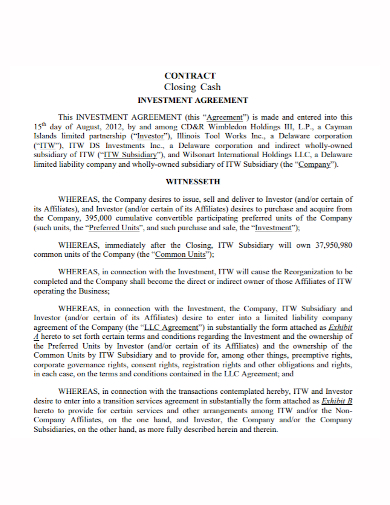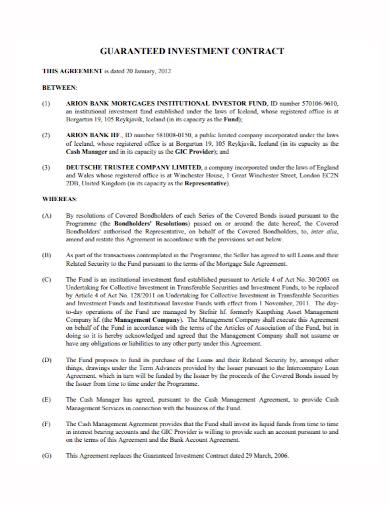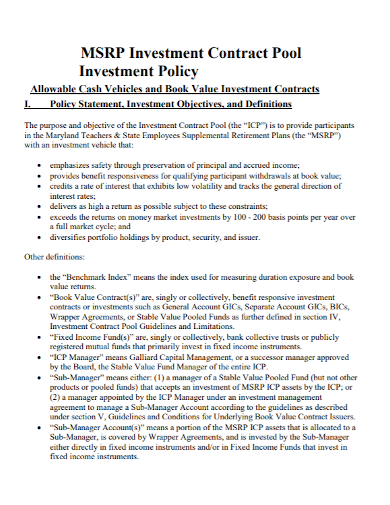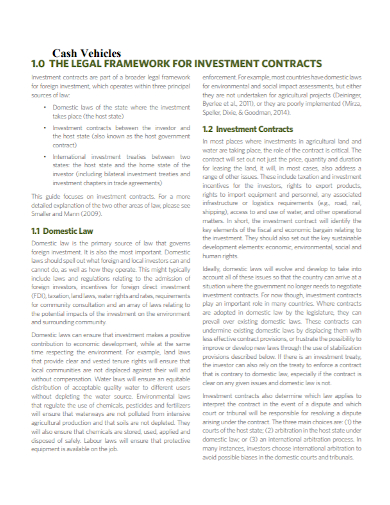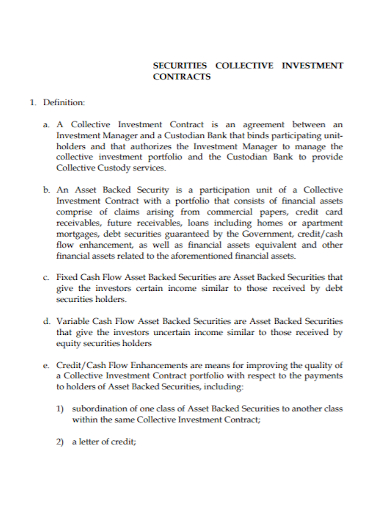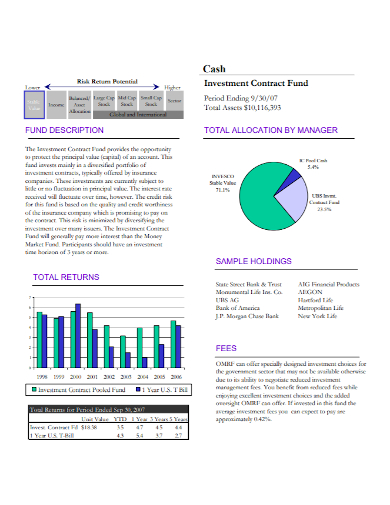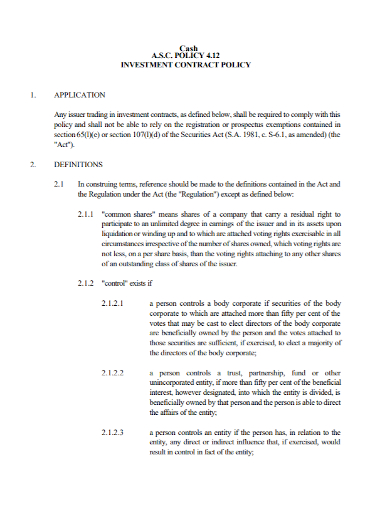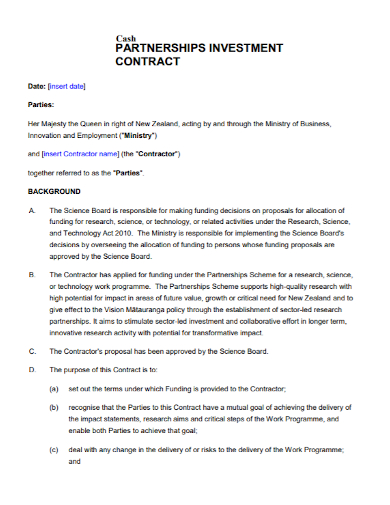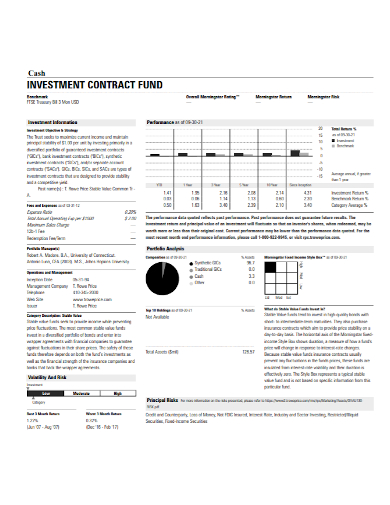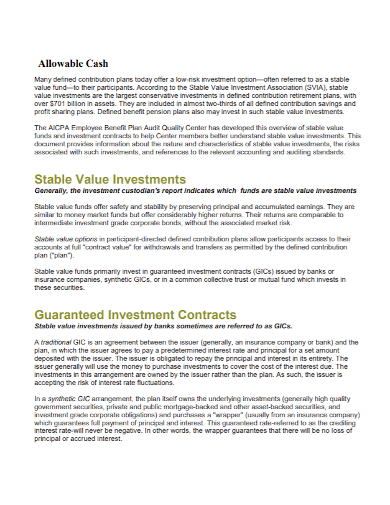Cash investment is typically thought of as a relatively safe, low-risk place to put the cash that provides nearly as much liquidity as physical cash while earning a higher return. Accumulating cash into bank accounts, money market accounts, certificates of deposits (CDs), and short-term fixed-income instruments such as Treasury bills are all examples of cash investments. Individuals who understand cash investments can get more out of money they might not otherwise invest. Find out if cash investments are a good fit for your portfolio.
10+ Cash Investment Contract Samples
Investment in short-term instruments or savings accounts, generally for a period of 90 days or less, that generally carries a low rate of interest or return with a comparatively low rate of risk when compared to other modes of investment, is referred to as cash investment.
1. Cash Investment Contract Template
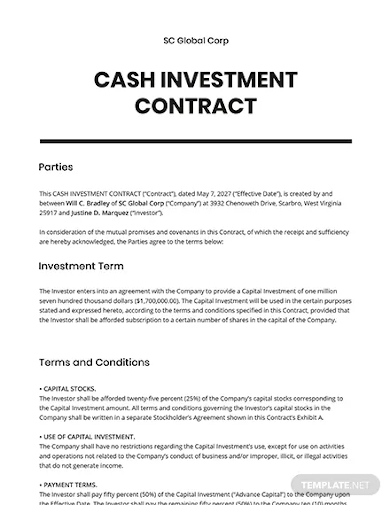
2. Closing Cash Investment Contract
3. Guaranteed Cash Investment Contract
4. Cash Investment Policy Contract
5. Vehicle Cash Investment Contract
6. Cash Flow Investment Contract
7. Cash Investment Fund Contract
8. Cash Policy Investment Contract
9. Partnership Cash Investment Contract
10. Sample Cash Investment Contract
11. Cash Value Investment Contract
Understanding Cash Investments
Secure investment vehicles, such as cash investments, are preferred by investors seeking a safe investment and capital preservation. Cash investments include money market accounts (MMAs) and certificates of deposit (CDs). The investor’s decision on which of these cash investments to make is based on whether or not they want to lock in a specific yield.
Cash investments are typically made by investors who require a temporary safe haven for their funds while they research other investment options. Cash investments offer investors a low-risk yield and high liquidity. Despite the fact that interest rates are low and that a favorable interest rate can only be locked in for a limited time, an investor can get their money in a short period of time.
Lenders typically require borrowers to have “skin in the game,” especially for large loans, in the credit industry. A property buyer who takes out a mortgage, for example, is expected to make a cash investment in the form of a down payment. The lender’s risk is reduced by the borrower’s cash investment because the borrower will have something to lose if he defaults on the mortgage. To protect the lender’s interests, if the borrower’s cash investment is less than 20%, the lender will ask the borrower to acquire private mortgage insurance (PMI).
Types of Cash Investment
- Savings Account – Some people think of a savings account as a cash investment option. The FDIC insures the money in the account. The interest rate on these accounts, however, is negligible. A savings account’s average interest rate is only 0.09 percent. Investors who want access to their money at any time but need a slightly higher rate of return should put their money in high yield savings account offered by local banks.
- Money market – This is a very short-term investment with a typical maturity of fewer than six months. They’re high-yielding investments with variable interest rates. Money market accounts typically pay a higher rate of interest than cash savings accounts. Commercial paper and Treasury bills are examples of money market instruments.
- Certificate of Deposit (CD) – A CD works similarly to a bond in that it pays investors interest on a regular basis and funds are held for a set period of time. However, unlike bonds, which can be sold before maturity, funds in a CD are locked in if they are held with a bank. Withdrawing money will result in a penalty, but this is not the case with CDs held with a brokerage that allows selling on secondary markets before maturity.
FAQs
What are some of the advantages of having a cash investment?
When a cash emergency arises, cash investments can assist in meeting those unexpected expenses because they are highly liquid assets. It’s also very easy to convert into cash. As a result, it prevents the investor from selling assets such as stocks or bonds that may be part of his or her portfolio. As a result, keeping cash on hand is a simple way to meet these financial obligations.
What are some of the disadvantages of having a cash investment?
The most significant disadvantage of cash investment is the investment’s overall rate of return. Because these investments are safe by nature, they do not provide the same level of return as riskier investments. The lower the risk, the lower the return on that less risky investment.
These are highly liquid, short-term assets that can be easily converted to cash. They have a low-risk profile, which some investors prefer, but they also have a very low rate of return, which may turn off some investors. These are used by people who need a temporary safe haven for their money while they look into other investment options. This is advantageous in the event of a financial emergency because the investor can quickly and easily access the funds he has invested. Certificates of deposits, Treasury bills, and savings accounts, among other cash investments, provide investors with a steady and low-risk income stream in the form of regular interest payments.
Related Posts
Sample Excuse Letter for School
Feature Writing Samples
FREE 10+ Security Guard Contract Samples in PDF | MS Word
FREE 10+ Option to Purchase Agreement Samples in MS Word | Apple Pages | PDF
FREE 26+ Curriculum Form Samples in MS Word | PDF
FREE 20+ Cleaning Service Proposal Samples in PDF | MS Word
FREE 29+ Sample Loan Application Form Templates in MS Word | PDF
FREE 10+ Event Venue Contract Samples in PDF | MS Word | Pages | Google Docs
FREE 10+ SBAR Samples in PDF | DOC
FREE 12+ Music Band Contract Templates in PDF | MS Word
FREE 10+ HVAC Maintenance Contract Samples in PDF | MS Word
FREE 10+ Social Media Marketing Contract Samples in MS Word | PDF
FREE 10+ Wholesale Assignment Contract Samples in PDF
FREE 18+ Financial Proposal Samples in PDF | MS Word | Google Docs | Pages
FREE 10+ Feasibility Study Samples in PDF

